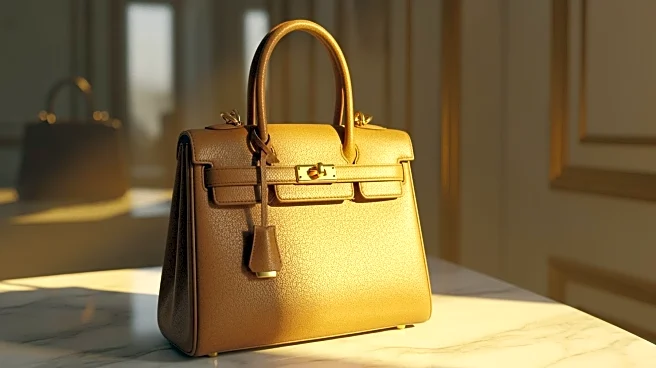What's Happening?
Dior's CEO, Delphine Arnault, has expressed a positive outlook for the future of the luxury brand, citing improving trends in the luxury market. Arnault, who leads one of the most prestigious brands within
LVMH, the world's largest luxury group, shared her optimism in an interview with La Tribune Dimanche. Despite several months of slowing sales, LVMH reported improving trends in the third quarter, suggesting a potential recovery in global luxury spending. Arnault emphasized the importance of maintaining a long-term perspective, focusing on a ten or twenty-year outlook rather than short-term fluctuations. The U.S. market remains crucial for Dior, with high purchasing power and strong consumer interest, as evidenced by the recent opening of two new stores in New York and Los Angeles.
Why It's Important?
The optimism expressed by Dior's CEO reflects broader trends in the luxury industry, which has faced challenges in recent quarters. The improving sales trends reported by LVMH could signal a recovery in global luxury spending, which is significant for economic stakeholders in the luxury sector. The U.S. market's importance to Dior highlights the country's role as a key driver of luxury consumption, with its high purchasing power and consumer interest. This could lead to increased investment and expansion by luxury brands in the U.S., benefiting local economies and employment. The focus on long-term growth strategies suggests a shift towards sustainable business practices in the luxury industry.
What's Next?
Dior's strategic focus on the U.S. market and the opening of new stores indicate potential growth opportunities in the region. As the luxury market shows signs of recovery, other luxury brands may follow suit, expanding their presence in key markets like the U.S. This could lead to increased competition and innovation within the industry. Stakeholders will likely monitor consumer spending trends closely to gauge the sustainability of the recovery. Additionally, Dior's emphasis on long-term planning may influence other brands to adopt similar strategies, prioritizing sustainable growth over short-term gains.
Beyond the Headlines
The luxury industry's recovery could have broader implications for global economic trends, particularly in consumer spending and market confidence. As luxury brands focus on long-term growth, there may be increased emphasis on ethical and sustainable practices, aligning with consumer demand for responsible business operations. This shift could lead to changes in production methods, supply chain management, and marketing strategies within the industry. Furthermore, the resilience of the luxury market may serve as an indicator of economic stability, influencing investor confidence and market dynamics.









